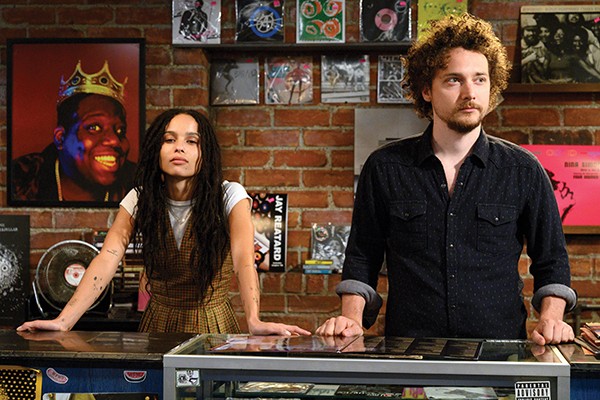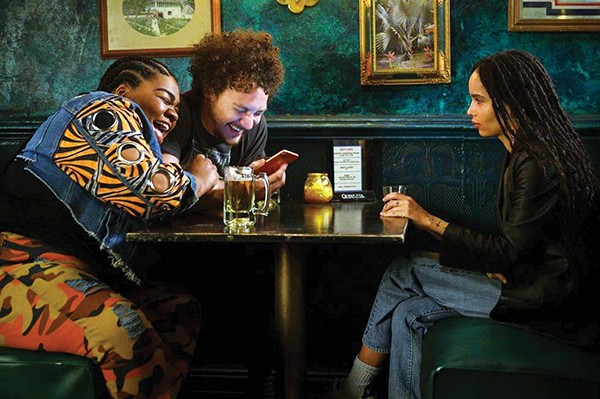Before embarking on a musical biopic project, all filmmakers should be required to watch two films: First, Walk The Line, the made-in-Memphis story of Johnny Cash’s romance with June Carter, which is probably the best musical biopic ever made; then Walk Hard: The Dewey Cox Story, which skewers musical biopics so expertly it almost killed the entire genre.
Director Reinaldo Marcus Green has clearly studied Walk The Line for Bob Marley: One Love. It takes roughly the same approach to its subject, isolating one specific story line out of an artist’s rich and complex life story to illuminate the character behind the music. In this case, it’s the story of the recording of Exodus, Marley’s 1977 album which Time called the greatest musical achievement of the twentieth century. After a brief opening sequence where young Nesta Robert Marley (Nolan Collingnon) and his mother Cedilla (Nadine Marshall) move from the plantation to Kingston, we meet adult Bob Marley (Kingsley Ben-Adir) as the already rich and famous king of reggae. Jamaica in the mid-’70s was riven by what amounted to a low-intensity civil war between supporters of democratic socialist Prime Minister Michael Manley and his reactionary rival Edward Seaga. As the violence intensified, Marley was asked to play the Smile Jamaica concert, which was intended to, if not unify the country, at least convince people to stop killing one other by bringing them together in a shared love of reggae. During the promotional press conference, Marley refused to take sides, instead declaring that all Earthly rulers are “Babylon”, and that true peace could only be achieved through Rastafarianism, the cannabis-infused Pan-Africanist cult descended from Judaism which reveres Ethiopian ruler Haile Selassie as a liberationist messiah.
His message does not go over well with the Powers That Be, and someone (probably Seaga, but maybe the CIA) ordered a hit on Marley. Two days before Smile Jamaica, as the band was rehearsing, gunmen infiltrated Marley’s family compound and shot Marley, his manager Don Taylor (Anthony Welsh), and wife Rita (Lashana Lynch). As his band fled the country, the wounded Marley promised to keep his commitment to his people and perform one song. When Marley took the stage in front of 80,000 people at Smile Jamaica, he showed the crowd his still-bloody gunshot wounds, and launched into “War,” whose lyrics Marley adapted from Haile Selassie’s 1963 speech to the United Nations. “Until the philosophy which holds one race superior and another inferior is finally and permanently discredited and abandoned; that until there are no longer first-class and second-class citizens of any nation; that until the color of a man’s skin is of no more importance than the color of his eyes, and until the basic human rights are equally guaranteed to all without regard to race; that until that day, the dream of lasting peace and world citizenship and the rule of international morality will remain but a fleeting illusion to be pursued, but never attained.”
As you can see, Green and his three screenwriters have a much more complex job than, say, the makers of Bohemian Rhapsody. The Smile Jamaica sequence is more compelling than Queen at Live Aid, but you can be forgiven if you come out of One Love not knowing who was fighting whom, or why they wanted to kill a popular musician. The film’s fundamental flaw is that Bob Marley doesn’t deserve the Walk The Line treatment—he deserves Malcom X, a sweeping historical biography which connects all the dots. The filmmakers sense this, and try to cover some ground with flashbacks. Unfortunately, these flashbacks often come in exactly the way Walk Hard parodies, with the artist remembering his trauma as he walks onstage.
But my job as is not to review the film that “should be,” but rather the one that exists. Yes, Bob Marley: One Love is a stodgy, conventional biopic, but at least it’s done well. Ben-Adir, one of the most talented actors of his generation, disappears into the role. He struggles mightily to rise above mere mimicry of Marley’s distinctive patois and reveal the legend’s inner life. When Ben-Adir and Lynch are together as Bob and Rita, the film crackles with life—only to lose the momentum with meandering scenes in London recording studios and swanky Paris parties. Green and Ben-Adir take pains to emphasizes their hero’s spirituality. A smoky Rastafarian ceremony makes clear that reggae is, like American soul, thinly secularized religious music. One Love sees Marley as a Rasta Apostle Paul, an evangelist who refined the message of a revolutionary cult into a universalist religion.
For a glimpse into the fuller story, I recommend the 2012 documentary Marley. While Bob Marley: One Love is far from perfect, at least its heart is in the right place.





